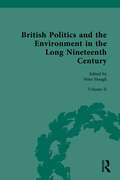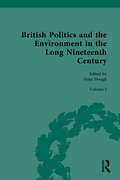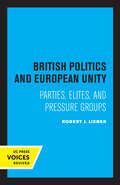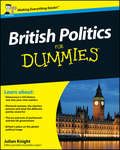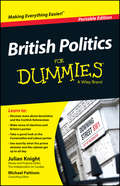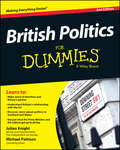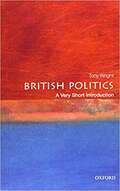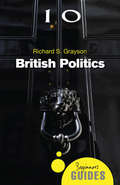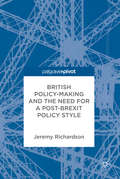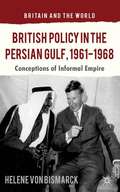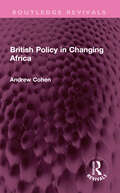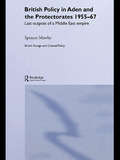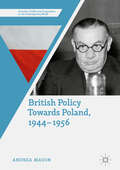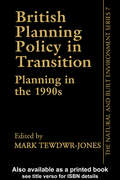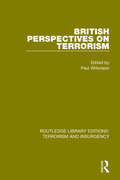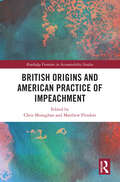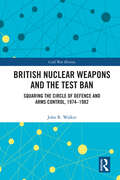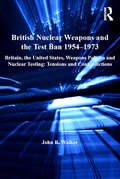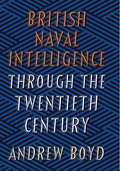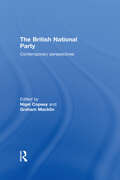- Table View
- List View
British Politics and the Environment in the Long Nineteenth Century: Volume II - Regulating Nature and Conquering Nature
by Peter HoughThis collection of archival source material chronicles British environmental politics between 1789 and 1914. This text examines the ways in which environmental issues were managed artistically and socially, as well as politically. Accompanied by extensive editorial commentary, this collection will be of great interest to students of environmental and political history.
British Politics and the Environment in the Long Nineteenth Century: Volume I - Discovering Nature and Romanticizing Nature
by Peter HoughThis volume of archival source material chronicles British environmental politics between 1789 and 1914. This text examines scientific discoveries during this period and the result of these findings on the political environment, bringing the publics attention to public health issues such as acid rain and river pollution. Accompanied by extensive editorial commentary, this collection will be of great interest to students of environmental and political history.
British Politics and European Unity: Parties, Elites, and Pressure Groups
by Robert J. LieberThis title is part of UC Press's Voices Revived program, which commemorates University of California Press’s mission to seek out and cultivate the brightest minds and give them voice, reach, and impact. Drawing on a backlist dating to 1893, Voices Revived makes high-quality, peer-reviewed scholarship accessible once again using print-on-demand technology. This title was originally published in 1970.
British Politics For Dummies
by Julian KnightSo - you want to be knowledgeable about British politics but don't know where to start. The rich history, complex statistics and tricky political jargon are getting in your way, not to mention the media hype (is politics only about duck houses and moats?). But don't worry! British Politics For Dummies is your essential guide to understanding even the trickiest questions surrounding politics in the UK, so you'll be discussing the ins and out of leaders, parties, ideologies, constitutions, laws, cabinets and summits past and present in no time - and with maximum confidence. Coming up to the potential end of Labour's historic three terms in power, there's never been a better time to get to grips with politics.British Politics For Dummies includes:Part 1: The Basics of PoliticsChapter 1: Taking in the Political UniverseChapter 2: Understanding Why Politics and Politicians are ImportantChapter 3: Looking at Democracy & ParticipationChapter 4: Examining Different Political IdeologiesChapter 5: Forming of the British Political StatePart 2: Elections and Britain's PartiesChapter 6: Electoral & voting systemsChapter 7: Voting Behaviour & TrendsChapter 8: Honing in on Political PartiesChapter 9: Pressure GroupsChapter 10: Politics & the MediaPart 3: The Ins & Outs of ParliamentChapter 11: Britain's ConstitutionChapter 12: Examining Britain's Parliamentary DemocracyChapter 13: Gazing at the Summit: the PM and CabinetChapter 14: Ministers & Civil ServantsChapter 15: The Courts & The JudiciaryChapter 16: Laying Bear Devolution & Local GovernmentChapter 17: Joining the Lawmakers: Becoming a PoliticianPart 4: Politics WorldwideChapter 18: Understanding Britain's Place in the WorldChapter 19: Taking in the International StageChapter 20: Expanding Your Horizons: EuropeChapter 21: Leading the Free World: US PoliticsPart 5: Parts of TenChapter 22: Ten Significant Prime MinistersChapter 23: Ten Major Political ScandalsChapter 24: Ten Events Which Formed the Modern Political WorldChapter 25: Ten Political Trends for the Future
British Politics For Dummies
by Julian KnightYour guide to British politics Packed with accessible information on the origins, history, and structure of the UK parliamentary system, British Politics For Dummies offers a fascinating insight into the rollercoaster world of politics. Explaining everything from key political ideologies and the spread of democracy to the current election process and the differences between political parties, this guide is the ultimate companion to British politics and elections. In the book, you'll discover the origins of democracy, political ideologies and the British political state, how elections and British political parties really work, the lowdown on parliament, insight into local politics and devolution, examination of British politics on the world stage, and so much more. Includes expanded coverage of coalition governments and how they work Features information on the key political parties, including the Tories, Labour, the Lib Dems, and UKIP and Britain's place in Europe Focuses on the history of devolved governments in Northern Ireland, Scotland and Wales Gives you plain-English access to the PM, the Cabinet, ministers, and civil servants, along with the role of the courts If you're a lifelong learner interested in learning more about politics, a university or sixth-form student studying the topic, or anyone interested in boosting their knowledge of politics, British Politics For Dummieshas you covered.
British Politics For Dummies
by Julian Knight Michael PattisonYour updated and revised guide to British politics So, you want to be knowledgeable about British politics but don't know where to start? You've come to the right place! British Politics For Dummies is your essential guide to understanding even the trickiest questions surrounding politics in the UK. In no time, you'll have the confidence to discuss the ins and outs of past and present elections, political leaders, parties and ideologies. Packed with understandable information on the origins, history and structure of the UK parliamentary system, British Politics For Dummies offers a fascinating glimpse into the rollercoaster world of politics. Explaining everything from key political ideologies and the spread of democracy to the current election process and the differences between political parties, this hands-on, friendly guide is an ideal companion to British politics and elections. Includes expanded coverage of coalition governments, devolution and independence efforts Provides updated information on UKIP and Britain's place in Europe Serves as a helpful guide to elections and British political parties—electoral systems, voting behaviour and trends and the role of pressure groups and the media Offers a fascinating examination of British politics on the world stage Whether you want to get to grips with British politics and government or build your knowledge beyond the basics, this updated edition of British Politics For Dummies is the place to start.
British Politics (Very Short Introductions Series)
by Tony WrightAt a time when politics in Britain is experiencing unprecedented turmoil, this Very Short Introduction examines the past, present, and possible future of British politics. Tony Wright puts current events into a longer and larger perspective, ranging from political ideas to political institutions, and offering an overview of the British political tradition. Throughout, he identifies key characteristics and ideas of British politics, and investigates what makes it distinctive, while emphasizing how these characteristics are reflected in the way the political system functions. <p><p> This new edition includes key material on Brexit, analysing the divisions revealed by the Brexit vote and the extent to which Britain now has a politics of identity, and considering whether the referendum itself has fundamentally altered the constitutional landscape.
British Politics
by Richard S. GraysonParliament is reeling from the expenses scandal, and an increasingly apathetic public can see no difference between Labour, Tory, and the Liberal Democrats. In British Politics: A Beginner's Guide, Richard Grayson asks if the blame for this lies at Westminster, or if we actually get the politicians we deserve. Covering the structure of the British government, the Civil Service, political parties, the media, the EU, and the special relationshipA" with the US, this incisive introduction reveals the complex interactions that determine everything from the taxes we pay to when we should put out the wheelie bin.
British Politics
by Richard S. GraysonBritain lies at a crossroads. With a financial system on its knees, a dwindling army, and its international influence waning, what is the role of UK in the international sphere? And with the changing priorities of the Obama administration, does "the special relationship" really mean anything? Telling you all you need to know about the first modern democracy, Richard Grayson covers the structure of the British government, the political parties, the power of the media, and where Britain stands internationally. Containing a detailed history of its politics, this is a perfect resource for anyone interested in America's closest ally. Dr Richard Grayson is Head of Politics at Goldsmiths, University of London.
British Political Facts
by David Butler Gareth ButlerThe 10th edition of a library classic, British Political Facts records the who, the what and when of British political life from 1900 to the present day. Thoroughly researched and updated, this reliable and unique work is a treasure trove of information for scholars and politicos alike.
British Political Culture and the Idea of 'Public Opinion', 1867-1914
by James ThompsonNewspapers, periodicals, pamphlets and books all reflect the ubiquity of 'public opinion' in political discourse in late nineteenth and early twentieth-century Britain. Through close attention to debates across the political spectrum, James Thompson charts the ways in which Britons sought to locate 'public opinion' in an era prior to polling. He shows that 'public opinion' was the principal term through which the link between the social and the political was interrogated, charted and contested and charts how the widespread conviction that the public was growing in power raised significant issues about the kind of polity emerging in Britain. He also examines how the early Labour party negotiated the language of 'public opinion' and sought to articulate Labour interests in relation to those of the public. In so doing he sheds important new light on the character of Britain's liberal political culture and on Labour's place in and relationship to that culture.
British Policy-Making and the Need for a Post-Brexit Policy Style
by Jeremy RichardsonThis book revisits and re-defines the policy style concept and explores the long-standing debate in British political science concerning how best to characterise the British policy style. The book highlights several trends that suggest that the British policy style has shifted towards the impositional end of the policy style spectrum, bringing it more in line with the traditional Westminster model of governing. However, these changes also reflect a more frenetic policy style which might increase the number of policy blunders and failures in British Government unless means are found to access and manage the specialist expertise that interest groups possess.
British Policy in the Persian Gulf, 1961-1968
by Helene Von BismarckAn in-depth analysis of Great Britain's policy in the oil-rich Persian Gulf region during the last years of British imperialism in the area, covering the period from the independence of Kuwait to the decision of the Wilson Government to withdraw from the Gulf.
British Policy in Changing Africa (Routledge Revivals)
by Andrew CohenOriginally published in 1959 by a former Governor of Uganda and Head of the Africa Division of the former Colonial Office, this book is a concise exposition of British aims and methods in colonial Africa and the extent of British influence, and the way the region was administered before the war with insufficient staff and money. The problems around the transfer of power in countries such as Ghana and Kenya are also discussed, along with the problems of government from Whitehall and local government.
British Policy in Aden and the Protectorates 1955-67: Last Outpost of a Middle East Empire (British Politics and Society)
by Spencer MawbyThis is the first detailed account of the confrontation between Britain and President Nasser of Egypt over the Colony of Aden and the surrounding protected states, prior to British withdrawal in 1967. Paying particular attention to the conflicting goals of Arab nationalism and British imperialism, it is argued that Britain’s motivation for this campaign was not solely material but was partly derived from a determination to contain Nasser’s influence and to guarantee a continuation of Britain’s role in influencing the politics of the Arabian peninsula. Mawby argues that a significant problem for the British was the decision to undertake a new imperial adventure in Aden at a time when British economic and military power was on the wane, whilst support for the nationalist struggles in the Middle East and the United Nations was increasing. He goes on to suggest that British policy and the conduct of military campaigns facilitated the emergence of a radical brand of Arab politics in southwest Arabia. By demonstrating the manner in which the rise and fall of British imperialism was telescoped into a short period in the late 1950s and early 1960s, this volume provides an important insight into the unique and unacknowledged place of Aden in the history of British decolonization.
British Policy Towards Poland, 1944–1956 (Security, Conflict and Cooperation in the Contemporary World)
by Andrea MasonThis book examines the outcome of the British commitment to reconstitute a sovereign Polish state and establish a democratic Polish government after the Second World War. It analyses the wartime origins of Churchill’s commitment to Poland, and assesses the reasons for the collapse of British efforts to support the leader of the Polish opposition, Stanisław Mikołajczyk, in countering the attempt by the Polish communist party to establish one-party rule after the war. This examination of Anglo-Polish relations is set within the broader context of emerging early Cold War tensions. It addresses the shift in British foreign policy after 1945 towards the US, the Soviet Union and Europe, as British leaders and policymakers adjusted both to the new post-war international circumstances, and to the domestic constraints which increasingly limited British policy options. This work analyses the reasons for Ernest Bevin’s decision to disengage from Poland, helping to advance the debate on the larger question of Bevin’s vision of Britain’s place within the newly reconfigured international system. The final chapter surveys British policy towards Poland from the period of Sovietisation in the late 1940s up to the October 1956 revolution, arguing that Poland’s process of liberalisation in the mid-1950s served as the catalyst for limited British reengagement in Eastern Europe.
British Planning Policy: Planning In The Major Years
by Mark Tewdwr-JonesFirst Published in 1995. Routledge is an imprint of Taylor & Francis, an informa company.
British Perspectives on Terrorism (Routledge Library Editions: Terrorism and Insurgency)
by Paul WilkinsonWhen originally published in 1981 this was the first book to bring together in one volume some of the most thoughtful work by British academics and specialists studying the political violence and terrorism which had recently challenged Britain and other Western democracies. Four chapters consider the strategy and tactics of the IRA and the problems of the Northern Ireland conflict. Other articles discuss the phenomena of international terrorism. Essential reading for courses on political violence, revolution war and staregic studies, this volume will also be of relevance for training course in military and police staff colleges.
British Origins and American Practice of Impeachment (Routledge Frontiers in Accountability Studies)
by Chris Monaghan and Matthew FlindersThis collection brings together historians, political scientists and legal scholars to explore the Anglo-American origins of impeachment and its use in the USA. Impeachment originated in England during the Good Parliament of 1376. It was used, subject to several periods of disuse, until the beginning of the 19th century. The British form of impeachment in turn inspired the drafters of the US Constitution and the inclusion of a mechanism permitting the removal of members of the federal executive and federal judiciary. These Anglo-American origins of impeachment have inspired many constitutions around the globe to include impeachment mechanisms which permit, in most cases, the legislature to remove the President, a Prime Minister, ministers and judges. This volume explores the origins, influence and practice of impeachment. Divided into three parts, the history of impeachment and how it developed in British history is the focus of part one. The inclusion of Ireland reflects the constitutional status of impeachment, the legacy of union with Great Britain and how impeachment can still serve as a deterrent. Part two examines the adoption of impeachment within the US Constitution and its use in practice. The third and final part discusses impeachment in the 21st century. The book will be an essential resource for students, academics and researchers in law, political science and history.
British Nuclear Weapons and the Test Ban: Squaring the Circle of Defence and Arms Control, 1974-82 (Cold War History)
by John R. WalkerThis book provides an overview of how the UK tried to maintain and modernize its strategic and tactical nuclear weapons during 1974-82, whilst also pursuing a comprehensive nuclear test ban treaty. The core question addressed in the book is how a test ban treaty would impact on the reliability and safety of the UK’s nuclear weapons and how this would constrain and limit efforts to secure a comprehensive treaty that would prohibit nuclear testing indefinitely. An added complication lay in the fact that a ban treaty could also prevent or limit the UK’s ability to test new warhead designs to replace its existing tactical nuclear weapons and a new strategic successor system to Polaris. How all of this played out between 1974 and 1982, when the UK announced its decision to acquire Trident and the US decided that a test ban treaty was no longer in its security interests, is discussed. A detailed review, based on the available materials in the UK National Archives, also looks at the aims and objectives of UK nuclear tests in Nevada and on the decisions taken on the Chevaline warhead and its Trident replacement. The book also considers whether there was a far greater threat to the UK nuclear programme from shortages of skilled craftsmen and industrial action at the Atomic Weapons Establishment at Aldermaston than from a test ban treaty. It also looks at whether nuclear defence trumped arms control objectives during this period. This book will be of much interest to students of British politics, nuclear proliferation and Cold War History.
British Nuclear Weapons and the Test Ban 1954-1973: Britain, the United States, Weapons Policies and Nuclear Testing: Tensions and Contradictions
by John R. WalkerIn 1962 Dean Acheson famously described Britain as having lost an Empire but not yet found a role. Perhaps nowhere is this more apparent than in the realms of nuclear weapons. An increasingly marginal world power, successive post-war British governments felt that an independent nuclear deterrent was essential if the country was to remain at the top table of world diplomacy. Focusing on a key twenty-year period, this study explores Britain's role in efforts to bring about a nuclear test ban treaty between 1954 and 1973. Taking a broadly chronological approach, it examines the nature of defence planning, the scientific goals that nuclear tests were designed to secure, Anglo-American relationships, the efficacy of British diplomacy and its contribution to arms control and disarmament. A key theme of the study is to show how the UK managed to balance the conflicting pressures created by its determination to remain a credible nuclear power whilst wanting to pursue disarmament objectives, and how these pressures shifted over the period in question. Based on a wealth of primary sources this book opens up the largely ignored subject of the impact of arms control on the UK nuclear weapons programme. Its appraisal of the relationship between the requirements and developments of the UK nuclear weapons programme against international and domestic pressures for a test ban treaty will be of interest to anyone studying post-war British defence and foreign policy, history of science, arms control, disarmament and non-proliferation and international relations. It also provides important background information on current events involving nuclear proliferation and disarmament.
British Novels and the European Union: DysEUtopia (St Antony's Series)
by Lisa BischoffThis book looks at the cultural, political and economic conditions of British Euroscepticism. Focusing on eight British dystopian novels, published in the years before the decisive In/Out-Referendum, and taking into account cultural, political and economic contexts, Lisa Bischoff shows how the novels’ stance towards the integration project range from slight criticism to outright hostility. The wide availability of the novels, and the prominence of both its authors and readers, among which are political figures David Cameron, Nigel Farage and Daniel Hannan, amplify the power of literary Euroscepticism. Drawing on cultural studies, literature and social science, British Novels and the European Union reveals the many facets of British Euroscepticism.
British Naval Supremacy and Anglo-American Antagonisms, 1914-1930
by Donald J. Lisio"During World War I, British naval supremacy enabled it to impose economic blockades and interdiction of American neutral shipping. The United States responded by building 'a navy second to none,' one so powerful that Great Britain could not again successfully challenge America's vital economic interests. This book reveals that when the United States offered to substitute naval equality for its emerging naval supremacy, the British, nonetheless, used the resulting two major international arms-control conferences of the 1920s to ensure its continued naval dominance"--
British Naval Intelligence through the Twentieth Century
by Andrew BoydAn acclaimed military historian examines the vital role of British naval intelligence from the mid-nineteenth century to the end of the Cold War.In this comprehensive account, Andrew Boyd brings a critical new dimension to our understanding of British naval intelligence. From the capture of Napoleons signal codes to the satellite-based systems of the Cold War era, he provides a coherent and reliable overview while setting his subject in the larger context of the British state. It is a fascinating study of how naval needs and personalities shaped the British intelligence community that exists today.Boyd explains why and how intelligence was collected and assesses its real impact on policy and operations. Though he confirms that naval intelligence was critical to Britains victory in both World Wars, he significantly reappraises its role in each. He reveals that coverage of Germany before 1914 and of the three Axis powers in the interwar period was more comprehensive and effective than previously suggested; and while British power declined rapidly after 1945, the book shows how intelligence helped the Royal Navy to remain a significant global force for the rest of the twentieth century.
British National Party: Contemporary Perspectives
by Nigel Copsey and Graham MacklinThis book examines the recent development of the far right in Britain, with a particular focus on the British National Party (BNP) the most electorally successful far right party in British history. It brings fresh perspectives to our understanding of the BNP in order to make a significant contribution to scholarly debate on the nature of far right extremism both nationally and internationally. The book is significantly different from other literature in the field primarily because of its focus on three important yet underdeveloped themes, which are reflected in the structure of the book itself. These are: the ideological and cultural politics of contemporary BNP responses to the BNP the BNP’s place within the contemporary domestic and international far-right milieu. Written by an outstanding line-up of renowned experts in this field, this is essential reading for all those with an interest in British politics, fascism, political parties, race relations and extremism.
